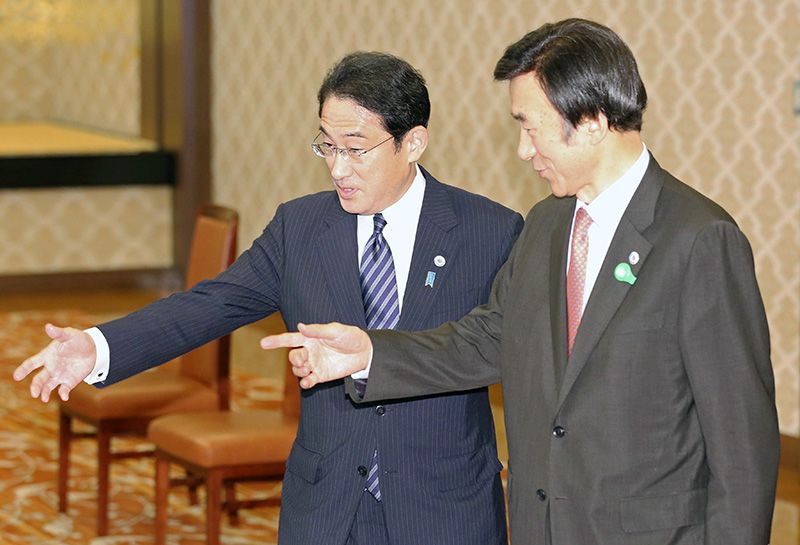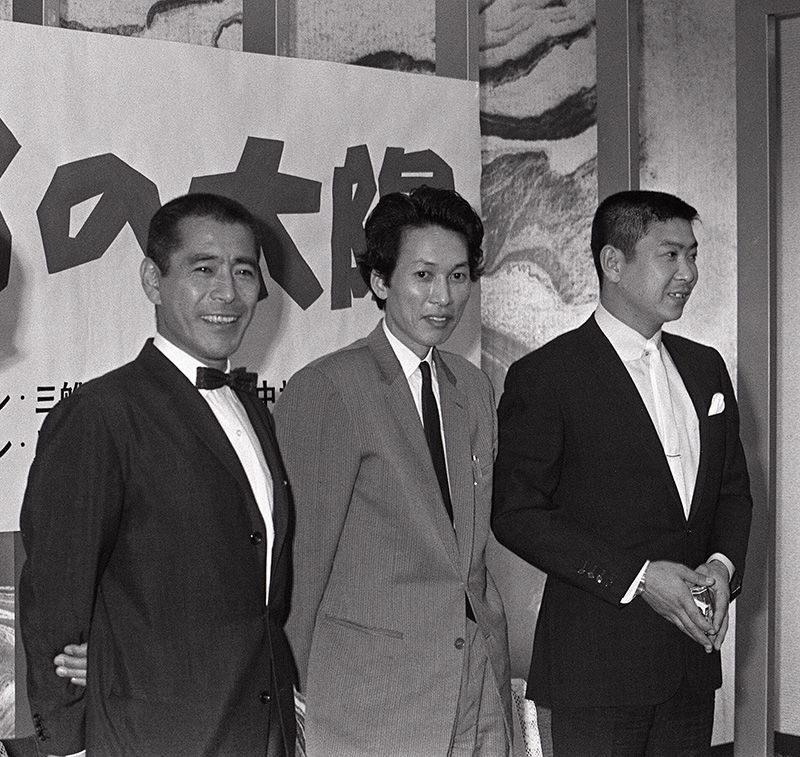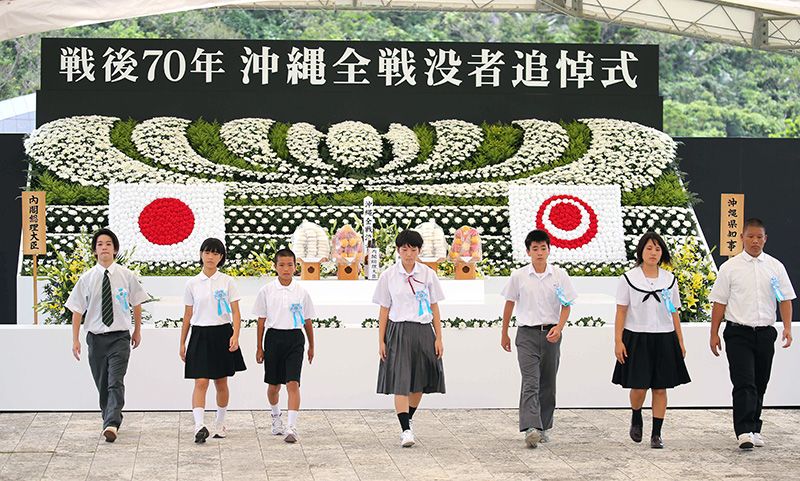Timeline for June 2015
Politics Economy Science Technology Society- English
- 日本語
- 简体字
- 繁體字
- Français
- Español
- العربية
- Русский
1
News emerges of a massive leak of personal information from the Japan Pension Service, which handles public pensions, after its computers are hacked via an email-borne virus. The hackers obtained names, addresses, dates of birth, and pension numbers for over 1 million citizens.
2–5
Philippine President Benigno Aquino III visits Japan, talking with Prime Minister Abe Shinzō on June 4. The two agree to start discussions on a Visiting Forces Agreement that could potentially allow Japan’s Self-Defense Forces to stop and refuel at Philippine bases. The action comes amid increasingly assertive behavior by Chinese naval forces in the South China Sea.
4
Speaking before the Lower House Commission on the Constitution, three constitutional law experts agree that security legislation including measures to allow exercise of the right of collective self-defense is unconstitutional. The unanimous verdict comes as a surprise, as one of the three scholars called to provide testimony was recommended by the ruling Liberal Democratic Party.
5
Prime Minister Abe selects Shima in Mie Prefecture as the venue for the 2016 Group of Seven summit to be held in Japan.
The Ministry of Health, Labor, and Welfare announces that the total fertility rate for 2014 dropped 0.01 from the previous year to 1.42. This figure, which indicates the average number of children born to a woman over her lifetime, fell for the first time in nine years after having risen slowly since the all-time low of 1.26 in 2005. Total births for 2014 were the lowest ever at 1.0 million, while the average age for women giving birth for the first time was 30.6.
6
Prime Minister Abe visits Ukraine before attending the G7 summit in Germany. He meets with President Petro Poroshenko, stating that he will not tolerate any attempt to alter the status quo by force and pledging continued economic support to stabilize the situation in the country.
7
The King and I, starring Watanabe Ken, wins Best Revival of a Musical and three other awards at the 2015 Tony Awards in New York. Watanabe is nominated for Best Performance by a Leading Actor in a Musical, but does not win.
10
Tokio Marine Holdings announces it will acquire US insurance firm HCC Insurance Holdings in a $7.5 billion deal. It is the largest ever overseas acquisition by a Japanese nonlife insurance company.
14
Prime Minister Abe meets Japan Innovation Party senior advisor and Osaka Mayor Hashimoto Tōru in Tokyo for three hours of talks, apparently seeking his cooperation in passing security legislation through the Diet. After the meeting, Hashimoto posts that “the Japan Innovation Party should draw a clear line between itself and the Democratic Party of Japan” on his personal Twitter account.
17
The voting age for Japan is reduced from 20 to 18 as a bill to amend the Public Offices Election Act is unanimously approved during a session of the House of Councillors. The change will come into force one year later, increasing the total number of voters by 2.4 million, or approximately 2%, in time for the 2016 upper house election.
18
Toyota head of communications and US citizen Julie Hamp is arrested after illegal painkillers are found in a parcel sent to her from the United States. Hamp, who is Toyota’s first female managing officer, denies the charges. On July 1 Toyota announces that Hamp will resign from her executive post.
21
Foreign Minister Kishida Fumio talks with his South Korean counterpart Yun Byung-se, who visits Japan for the first time since his February 2013 appointment. They agree to arrange a trilateral leadership summit including China as soon as possible this year. They also agreed to cooperate on promoting each other’s potential UNESCO World Heritage sites following South Korea’s earlier opposition to the Sites of Japan’s Meiji Industrial Revolution.
 Kishida Fumio and Yun Byung-se, the foreign ministers of Japan and South Korea, meet in Tokyo on June 21. (© Jiji)
Kishida Fumio and Yun Byung-se, the foreign ministers of Japan and South Korea, meet in Tokyo on June 21. (© Jiji)
22
Tokyo and Seoul mark the fiftieth anniversary of the signing of the Treaty on Basic Relations Between Japan and the Republic of Korea and the normalization of diplomatic relations. Prime Minister Abe attends a ceremony organized by South Korea in Tokyo and vows to improve ties, while President Park Geun-hye participates in a ceremony in Seoul organized by Japan.
The Hollywood Chamber of Commerce announces that actor Mifune Toshirō, star of such Kurosawa Akira classics as Rashōmon and Shichinin no samurai (Seven Samurai), will be posthumously honored with a star on the Hollywood Walk of Fame.
 Actors Mifune Toshirō (left) and Ishara Yūjirō (right) and director Kumai Kei (center) at a Tokyo press conference announcing the film Kurobe no taiyō (The Sands of Kurobe) on May 9, 1967. (© Jiji)
Actors Mifune Toshirō (left) and Ishara Yūjirō (right) and director Kumai Kei (center) at a Tokyo press conference announcing the film Kurobe no taiyō (The Sands of Kurobe) on May 9, 1967. (© Jiji)
23
A ceremony is held at the Peace Memorial Park in Itoman, Okinawa, to mark the seventieth anniversary of the end of the Battle of Okinawa, in which more than 200,000 people were killed. Prime Minister Abe and US Ambassador Caroline Kennedy are among the 5,400 attendees. In the peace declaration, Okinawa Governor Onaga Takeshi strongly criticizes the Abe administration’s plan to relocate US Marine Corps Air Station Futenma to Henoko in Nago.
 Okinawa students pictured after offering flowers at a June 23 ceremony at the Peace Memorial Park in Itoman honoring those Okinawans who died in World War II. (© Jiji)
Okinawa students pictured after offering flowers at a June 23 ceremony at the Peace Memorial Park in Itoman honoring those Okinawans who died in World War II. (© Jiji)
With the backing of the LDP, Kōmeitō, and others, the House of Representatives votes to extend the current Diet session (scheduled to conclude on June 24) by 95 days to September 27, with the aim of ensuring the passage of security legislation. This is the longest ever extension of an ordinary Diet session since the end of World War II.
24
The Nikkei average rises to 20,942.07, topping the high point of the IT bubble—20,833.21 on April 1, 2000—to reach its highest level in 18 and a half years.
27
LDP Secretary General Tanigaki Sadakazu announces that Youth Division leader Kihara Minoru has been removed from his post and suspended from holding any party executive positions for one year and that three lower house members have been severely reprimanded. This follows a meeting of a study group on June 25 at which participants suggested putting pressure on media outlets producing unfavorable coverage, such as by calling on sponsors to withdraw advertising.
29
The yen rises and stock prices fall amid fears of a Greek debt fault. The Nikkei average posts its biggest single-day point loss this year, falling 596.20 to 20,109.95.
30
A passenger commits suicide by pouring fuel over himself and setting fire to it in the front car of the Tōkaidō Shinkansen as it travels between Yokohama and Odawara in Kanagawa Prefecture. A female passenger also dies of smoke inhalation on the Nozomi 225, which departed Tokyo for Osaka earlier that morning. 26 other passengers are hurt. It is the first fire to take place on the Shinkansen.
Okinawa Shinkansen South Korea pension Toyota Watanabe Ken Ukraine Shima voting age